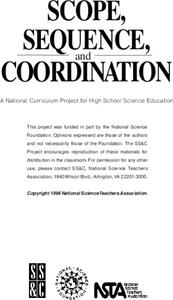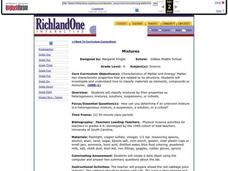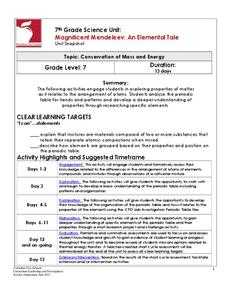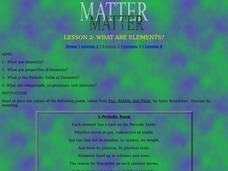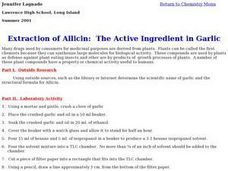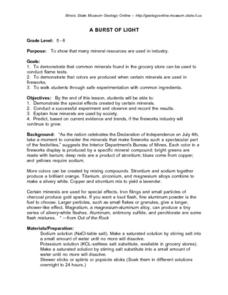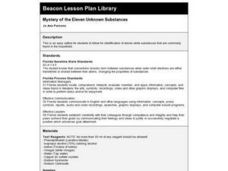Curated OER
Matter and Energy
Does the change in energy of matter lead to a change in mass? Upcoming chemists compare the mass of equal-volume, but different-temperature liquids and materials both before and after a chemical reaction has occurred. In another...
Curated OER
Mixtures
Sixth graders experiment with mixtures. In this chemistry lesson, 6th graders determine which mixtures are considered heterogeneous, a suspension, a solution or a colloid. Students create a data sheet of what they discover.
Curated OER
Programming the "Rinse Robot"
Experienced chemistry technicians use then layer chromatography to discover how much of a free compound is left after each rinse cycle. Where this could obviously be used as a practice with chromatography technique, it can also be used...
Curated OER
Polymers Lab: Bouncy Ball and Slime
Eighth graders investigate chemical reactions to produce polymers. In this polymers lesson plan, 8th graders experiment with sodium silicate and ethyl alcohol to make a polymer. They also experiment with borax and glue to make a polymer....
Columbus City Schools
Magnificent Mendeleev: An Elemental Tale
Discover how the periodic table tells the story of its elements. Learners begin by studying the makeup of several mixtures. Their analysis leads to a discussion of elements and the periodic table. As they dig deeper, they understand the...
Curated OER
Density Studies of the Earth
Density comes to life as investigators place soda cans into containers of various liquids to find if they sink or float. They layer different density liquids, compare densities of different gases, and more. A total of six different...
Curated OER
The Effects of Temperature on Chemical Mixtures
Students explore chemical cahnges and the effect of temperature on chemical mixturees, They make observations of the behavior and appearance of certain chemical mixtures and reactions.
Curated OER
Lab: Percent of Composition of KClO3
Students find the percent of oxygen in potassium chlorate. In this percent composition lesson plan, students heat a solution of potassium chlorate using a catalyst, manganese dioxide, to decompose the potassium chlorate and release...
Curated OER
Up and Atom
"Up and Atom" is a mini-unit introducing middle-schoolers to the wonders of elements. Participants draw atom models, examine the periodic table, compare samples of metals to nonmetals, identify unknown elements, and more! The beginning...
Curated OER
What Are Elements?
Students investigate elements by by defining scientific terms. In this Periodic Table of Elements lesson, students utilize a glass of water, and powdered fruit drink to perform a lab activity demonstrating properties of certain...
LABScI
Freezing Point Depression: Why Don’t Oceans Freeze?
Can you go ice fishing in the ocean? Learners examine the freezing point of different saltwater solutions. Each solution has a different concentration of salt. By comparing the freezing points graphically, they make conclusions about...
Chymist
Esters: An Introduction to Organic Chemistry Reactions
Scratch and sniff an introduction to organic chemical reactions. A creative lesson has individuals study the esters commonly used in scratch-and-sniff stickers and advertisements. Following the lab procedure, scholars create the organic...
Curated OER
Water Resource Engineering
Students examine solubility and the significance of water. In this aqueous solution instructional activity students complete a lab activity on soil profiles.
Curated OER
How To Culture Bacteria in the Laboratory
High schoolers participate in an experiment in which they culture bacteria in a lab setting. They record their observations and analyze the data. They answer comprehension questions to end the lesson.
Curated OER
Extraction of Allicin: The Active Ingredient in Garlic
Students conduct research to determine the structural formula for Allicin, a component of garlic. They participate in a lab to extract Allicin from garlic and complete a set of questions about their work.
Curated OER
A Burst of Light
Students discover the many uses of minerals in industry. They use minerals to conduct flame tests and to demostrate color. They practice safety tips in the lab.
Curated OER
Straw Chromatography
Students become acquainted with the principles of liquid chromatography and construct a liquid chromatography column. Students also investigate the effects of different solvents and solvent concentrations in the separation process.
Curated OER
Straw Chromatography
Students separate food coloring using liquid chromatography. In this chemistry instructional activity, students explain the effects of different solvents on the rate of separation.
Curated OER
Limiting Reagent
Students work in small groups with a small set of 8 nuts and 5 bolts to assemble into combinations of 1 nut: 1 bolt, and 2 nuts: 1 bolt. They explore the outcome and discuss. Then a student mixes two clear, colorless solutions together...
Curated OER
Mystery of the Eleven Unknown Substances
Fourth graders identify eleven white substances that are commonly found in the household. They, in pairs, perform experiments on a variety of substances, and must identify them based on the reactions they observe.


